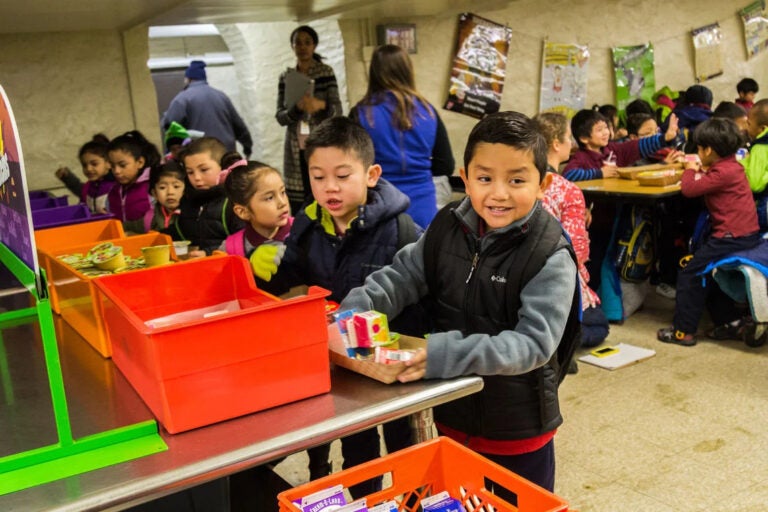Universal breakfast law makes Delaware one of few states offering free school meals
Delaware will spend about $3.2 million to expand free breakfast to 83 schools, so every student has access without cost.

File - Kindergartners and first-graders at Francis Scott Key Elementary in Philadelphia picking up breakfast items to eat in the cafeteria in 2018 (Darryl Murphy/The Notebook)
What are journalists missing from the state of Delaware? What would you most like WHYY News to cover? Let us know.
For Donna Spencer, the memory of struggling to feed her children is never far away. Decades ago, when her partner lost his job, she relied on food stamps and school lunch programs to make ends meet.
“I was very grateful, appreciative and all that because we didn’t have that kind of stuff back in the day like they do now,” Spencer said, noting how inflation has made things tighter for families today. “Coming back to current day, I think times are very, very hard for people.”
Now retired after 35 years working at Delaware Technical Community College, Spencer cares for her great-grandson Jeremiah. She makes him breakfast every morning, but she knows not every child starts their day with a meal.
“Most people, from what I’ve heard, and I know a lot of school teachers even before now, they’ll see these little kids and they’ll say, ‘I’m hungry.’ And they don’t get breakfast,” she said. “Sometimes, I don’t even know if they got lunch until they get free lunches. And I just think, ‘How are you going to learn if you’re hungry?’”
She says the new universal breakfast law will relieve some of that burden for families.
For Spencer, the impact is deeply personal.
“It makes my heart feel good that kids don’t have to be hungry. Because there’s nothing sadder than a child that’s hungry,” she said.
The state’s plan
Earlier this year, state lawmakers passed legislation that makes school breakfast available to all students, regardless of their household income.
Aimee Beam, director of the Nutrition Programs Workgroup at Delaware’s Department of Education, said the law ensures equal access to breakfast across all public schools.
“We will continue to leverage our existing federal nutrition programs and reimbursement, which is USDA-funded, but it helps with some state funding support to level the playing field. So it’s equal access, no child has to be paying for their breakfast,” she said. “We don’t have to worry about children feeling perhaps that they don’t want to get breakfast because they don’t have enough money to pay for it or they’re worried it would accumulate student debt on their account.”
The universal breakfast law doesn’t just help low-income families — it covers everyone, including middle- and upper-income students who would otherwise pay out of pocket.
Funding for the program comes largely from federal reimbursements through the U.S. Department of Agriculture, but the state is stepping in to cover the gap for any of the 83 schools that need more support.
“The majority of the funding is federal,” she noted. “The state is essentially going to be paying the difference between the federal free reimbursement rate for breakfast and the federal paid reimbursement rate for breakfast. So that’s what the state is picking up.”
Beam added that universal breakfast could help eliminate the stigma that students often feel around free or reduced meals.
“There’s no indication, like nobody would know. They just know that everybody can get breakfast at this point,” she said.
The way schools distribute breakfast food to all students also helps eliminate that stigma, too. “In grab and go or kiosk or whatever it may be, that also helps eliminate the stigma because everybody can just do it.”
Lawmakers’ push for universal breakfast
State Rep. Kim Williams, who chairs the Joint Finance Committee, said the conversation began with a push for universal lunch. But with costs estimated at $45 million, it wasn’t possible to fund.
“I worked with Solving Hunger, which is a national group, and they suggested that we try doing a universal breakfast, which cost the state $3.7 million, but being on JFC, I was able to use existing funds,” she said. “I took existing funds for one thing and moved it to pay for universal breakfast. So we didn’t use any new funding. We cut something in order to pay for it.”
The law expands access through the federal School Breakfast Program, making meals free for all students at participating public schools. But schools that already operate under the community eligibility provision or other special assistance programs are not included, since they already provide free meals to all students.
“The schools that have community eligibility provisions, they’re not in this because they’re already providing free lunch and breakfast,” Williams said. “Red Clay School District recently announced that they’re providing free lunch and breakfast to all their students … and they’re able to do that through the community eligibility provision.”
According to a fiscal note from the Office of the Controller General, the state will cover the gap between the federal reimbursement for paid meals and the higher reimbursement rate for free meals. For the 2025–2026 school year, that’s expected to cost about $3.2 million, with the cost rising slightly each year.
Williams said the investment is about making sure every child starts the day ready to learn.
“Kids are able to focus more, they’re able to pay attention, study, participate, and not worry about not having anything to eat since the night before,” she said. “At least we know every kid has the opportunity to get a bite to eat before they start their day in school.”
Delaware is one of only a handful of states in the nation to take this step. According to state leaders, although it will take some time, expanding to universal lunch is still in their plans.
This story was supported by a statehouse coverage grant from the Corporation for Public Broadcasting.

Get daily updates from WHYY News!
WHYY is your source for fact-based, in-depth journalism and information. As a nonprofit organization, we rely on financial support from readers like you. Please give today.







